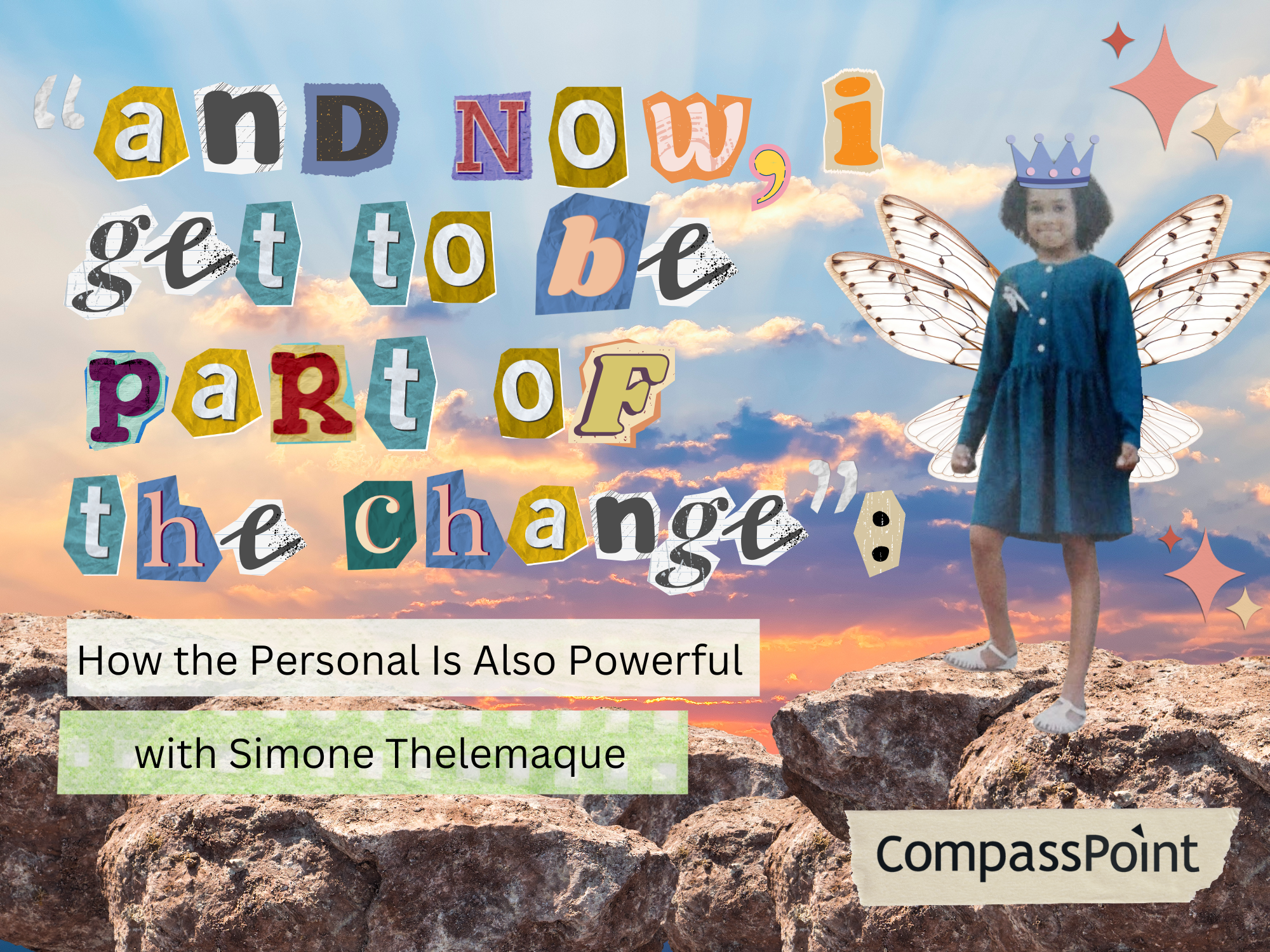Our office has been buzzing over the last few weeks with recommendations for great reads, which lets us know it’s time to share some new reading recommendations with you. Here’s another helping of our Summer Reading Guide, a peek into the authors and ideas that have entertained and inspired the CompassPoint staff and might do the same for you.
Every good summer blockbuster deserves a sequel, and that’s why we’re bringing you a second part to our Summer Reading Guide. Did you miss our reading guide the first time? Read last year’s list of picks here. This year, we have a few new folks on staff with great reading recommendations, as well as some fresh new endorsements from our veteran bookworms. Our new list of suggested reading covers social justice, superheroes, feminism, intersectionality, and more.
Let us know what books resonated with you and don’t forget to make your own suggestions in the comments below. Happy reading!
Byron Johnson (Senior Project Director) recommends:
Buck: A Memoir by M.K. Asante
Buck is a powerful memoir detailing how this amazing and resilient kid who could have easily been just another statistic found his life purpose despite the odds being stacked against him.
I Would Die 4 You by Touré
If you love Prince—and, even more importantly, understand his music and circuitous path—then this attempt by Toure to demystify the iconic one is a must-read. You won’t even mind the fact that the Purple One is not one of the voices solicited or that this is not really a biography.
Life in Motion: An Unlikely Ballerina by Misty Copeland
She rose from very humble beginnings to make history as the only African American soloist dancing with the prestigious American Ballet Theatre, and this biography tells the whole story of just how much she had to overcome and deal with in the process.
Michelle Gislason (Senior Project Director) recommends:
Bad Feminist by Roxane Gray
This woman opened up my brain and then took out a whole jumbled mess of thoughts on gender, feminism, oppression—and my deep, deep love of pop culture—and wrote a book that is seriously good. Critics have said she is inclusive and forgiving while also critical and examining. Yes indeedy. Her writing humanizes and makes accessible the notion of feminism and inequality. Loved it.
Amy Benson (Project Coordinator) recommends:
Americanah by Chimamanda Ngozi Adichie
The main character of this book is a Nigerian writer who authors a blog called: “Raceteenth or Various Observations About American Blacks (Those Formerly Known as Negroes) by a Non-American Black.” I just finished it on my recent vacation and loved it!
Boy, Snow, Bird by Helen Oyeyemi
This novel set in the 1950s deals with themes of race and gender, insider-outsider status, and is very beautifully written.
Kad Smith (Project Assistant) recommends:
Citizen by Claudia Rankine
A beautifully written American lyric, this book redefined my ideals of what prose is “supposed” to look like. Exploring the complex occurrences of the many ways racial aggressions occur in our society has never been so fluid, eloquent, and powerful at the same time. I would highly recommend this book for both reading you can pick up and come back to at your pace or for a book that you can completely bury yourself in during downtime.
The Fall by Albert Camus
This is a must-read for the 21st century philosopher. Comprised of a series of monologues, this book explores fundamental existentialist questions. You will find yourself asking while reading, “What is truth? What is success? What are we here for?” And if you’re anything like me, you’ll enjoy every second of it!
Maya Thornell-Sandifor (Part-time Project Director) recommends:
Devil in the Grove: Thurgood Marshall, the Groveland Boys and the Dawn of a New America by Gilbert King
It's a non-fiction account of Thurgood Marshall's journey to the Brown v. Board of Education victory. The story begins with the 1949 trial of the Groveland Boys, four young black men accused of raping a 17-year-old white girl in Lake County, Florida. While this is a non-fiction account, King is masterful at giving you a deep colorful portrayal of the characters and environment of the times, but also providing an account steeped in facts and details. It is written like a novel. I highly recommend it to anyone who is interested in the history of the NAACP Legal Defense Fund, Brown v. Board of Education, and Marshall's leadership.
Lupe Poblano (Project Director) recommends:
From Margin to Center by bell hooks
Over the past few months, I have found myself returning to Feminist Theory: From Margin to Center by bell hooks. I love hooks’ analysis of oppression that considers the intersecting nature of race, gender, and class. I admire how she makes the space for allies, and is also not afraid to call out people who center their perspectives based on their own privilege.
sujin lee (Project Director) recommends:
“Letter to My Son” article by Ta-Nehisi Coates
Blending memories of growing up in West Baltimore, lyrical analysis, and personal stories that wrench at your gut and soul, Ta-nehisi Coates writes on race, redemption, and how the historical and current exploitation of African Americans has created a world where Black folks have to constantly remind us that their lives matter while, in another universe, some White folks wonder what all the hubbub is about. Coates breaks it all down, in this moving excerpt from his recently released Between the World and Me. If you only read one article this summer – THIS IS THE ONE TO READ. And then share. And then talk about with your friends. And then go out and do something about it.
The Gods of Tango by Carolina de Robertis
Looking for a page-turning summer read for the beach, hammock, or lazy afternoon? The Gods of Tango, by Carolina de Robertis, is a rich, beautifully woven story filled with adventure, music, cross-continental travel, infused with stories of gender, sexuality, and race. This novel set in Argentina is sure to open your eyes, challenge your mind, and cause your heart to ache and swell – all the things one could want from a summer novel!
Maro Guevara (Project Coordinator) recommends:
Ms. Marvel by G. Willow Wilson with art by Adrian Alphona and colorist Ian Herring
Take a look at the current slate of movies out and it’s easy to see that the lack of diversity in the pantheon of superheroes is a sorry state. Enter Kamala Khan, a.k.a. Ms. Marvel—a Pakistani-American from New Jersey who also happens to be a superhero. Kamala has to balance kicking villain butt, navigating her cultural identity, and getting her homework done on time. It’s a great coming-of-age story that disrupts typical ideas of who our superheroes should be. It’s also gorgeously drawn! Share it with a teen in your life or be a shameless nerd like me and keep it for yourself.
Woe is I: The Grammarphobe's Guide to Better English in Plain English by Patricia T. O'Conner
If you do any kind of copyediting in your role, this book should definitely be in your library! It’s jam-packed with easy ways to memorize some of the thorniest grammar rules, and unlike your typical grammar guide, the author has a way of mixing in stories, great examples, and her own deft wit to make a dry subject come to life. It’s great—no ifs, ands, or buts… except for all of the ifs, ands, and buts
Asha Mehta (Project Director) recommends:
Racing to Justice by john a. powell
I first had the opportunity to hear john a. powell speak at the East Bay Meditation Center and have been a die-hard fan ever since. Brilliant and real at the same time, he connects history, social policy, philosophy, and spirituality to render a deep examination of race in America. Per the Amazon description, Racing to Justice “challenges us to replace attitudes and institutions that promote and perpetuate social suffering with those that foster relationships and a way of being that transcends disconnection and separation.” It places conceptions of whiteness and individualism within the context of the founding of the U.S. through ideals of European enlightenment. The last chapter brings it home by helping us see the nature of suffering and connecting this to spirituality and justice. A must-read.
What books are inspiring you and challenging you to think in different ways this summer? Share your recommendations in the comments section below.





Submit a comment